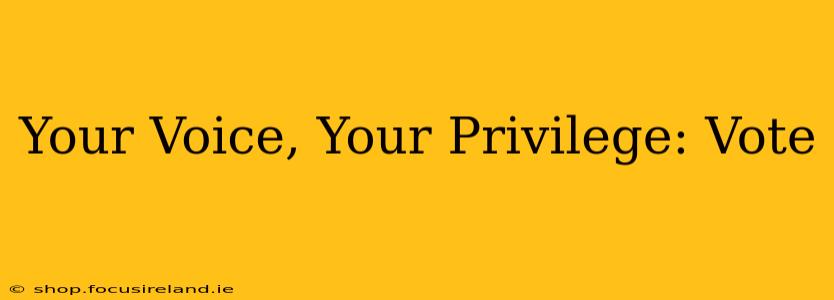Your Voice, Your Privilege: Understanding the Power and Responsibility of Voting
The right to vote is a cornerstone of democracy, a fundamental privilege that allows citizens to participate in shaping their government and future. But the seemingly simple act of casting a ballot is layered with complexities, particularly when considering the historical and ongoing disparities in access and influence based on factors like race, socioeconomic status, and geographic location. This article delves into the profound significance of voting, examining the privilege it represents and the responsibilities that accompany it.
What is the importance of voting in a democracy?
In a democratic society, voting acts as the bridge between the governed and the government. It's the mechanism through which citizens express their preferences, hold elected officials accountable, and influence policy decisions that directly impact their lives. Without active participation through voting, the democratic process weakens, potentially leading to policies that don't reflect the will of the people. The very essence of a representative democracy hinges on the ability of citizens to choose their leaders and shape their political landscape. It's a fundamental right and a crucial responsibility.
How does voting impact my life and my community?
The impact of voting extends far beyond the individual ballot. Local, state, and national elections determine everything from school funding and infrastructure projects to environmental regulations and healthcare policies. Your vote influences the laws that govern your community, the quality of public services you receive, and the overall direction of society. Even seemingly minor elections, such as those for local school boards, can have significant consequences on your daily life. Choosing to participate means actively shaping the environment in which you and your community thrive.
What are some of the challenges people face when trying to vote?
Unfortunately, the right to vote isn't universally accessible or equally exercised. Significant barriers persist, creating disparities in voter participation. These challenges include:
- Voter suppression: Historically and currently, various tactics have been employed to disenfranchise specific groups of voters. This includes restrictive voter ID laws, limited polling locations, gerrymandering, and purging voter rolls.
- Socioeconomic factors: Financial constraints, lack of access to transportation, and limited time off from work can prevent individuals from easily exercising their right to vote.
- Language barriers: For non-English speakers, navigating the voting process can be particularly challenging if materials and assistance aren't readily available in their native language.
- Lack of information: Understanding complex political issues and candidates can be daunting, potentially leading to voter apathy or uninformed choices.
Addressing these challenges requires comprehensive solutions, including expanding access to voter registration, providing transportation assistance, implementing language support programs, and promoting voter education initiatives.
Why is it important to vote even if I feel my vote doesn't matter?
The belief that a single vote doesn't matter is a common misconception. While one vote may not always determine the outcome of an election, it contributes to the overall picture. Collective participation is what drives change. Moreover, voting fosters a sense of civic engagement and empowers individuals to hold their elected officials accountable. Furthermore, a low voter turnout can embolden certain political agendas, while a high turnout demonstrates the strength of public opinion and necessitates responsiveness from elected officials.
What can I do to make sure my voice is heard?
Beyond simply casting your ballot, active participation in the democratic process involves staying informed about current events and political issues. Engage in respectful discussions with others, participate in community forums, contact your elected officials, and support organizations working to promote voter access and civic engagement. Remember, your voice is powerful, and your participation is crucial for a thriving democracy. Your privilege to vote carries with it a responsibility to exercise that right effectively and advocate for equitable access for all.

